|
|
|
Sort Order |
|
|
|
Items / Page
|
|
|
|
|
|
|
| Srl | Item |
| 1 |
ID:
182468


|
|
|
|
|
| Summary/Abstract |
Command agriculture is a contract farming scheme necessitated by land redistribution that ruptured Zimbabwe’s sources of resilience, distorted credit access, heightened tenure insecurity, and spiked vulnerability to droughts. Using qualitative analysis of extant literature, this article rationalizes the program’s nobility of cause but argues that the program alone cannot revamp agriculture. Notwithstanding how the program has evolved, revamping agriculture also encompasses policies that address fiscal prudence and macroeconomic resilience. Equally important is agricultural training that fosters skills and technologies that are not only climate-responsive but also meet the demands of the constantly evolving agrarian value chain.
|
|
|
|
|
|
|
|
|
|
|
|
|
|
|
|
| 2 |
ID:
182467


|
|
|
|
|
| Summary/Abstract |
There is a perception that soap operas are progressively infusing dominant social values and ideas while constructing and positioning indigenous cultures as peripheral and inconsistent with modernity. This article aims at ascertaining audience perceptions of and attitudes toward the construction and representation of indigenous cultures in Generations: The Legacy within the framework of indigeneity and audience reception theories. Using quantitative methodology, 350 questionnaires were distributed to a randomly selected sample. Findings showed the majority of the audience felt the soap represents indigenous cultures as the ‘insignificant other’ and perpetuates stereotypes about traditional indigenous groups. This process creates cultural tensions.
|
|
|
|
|
|
|
|
|
|
|
|
|
|
|
|
| 3 |
ID:
182475
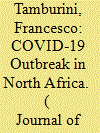

|
|
|
|
|
| Summary/Abstract |
North African nations, especially Egypt, Algeria, and Morocco, have been heavily affected by COVID-19 if compared to other African countries. Governments in North Africa took proactive legal measures to manage the virus threat, safeguarding population health, but also triggering repressive and invasive mechanisms that in some cases jeopardized basic freedoms and rights. This work will analyze comparatively the anti-COVID-19 legislations, pointing out how the legislative measures mirrored the level of transition of democracy, the opacity of some regimes, exploitation of the pandemic to foster repressive control, and highlighting the weakness of new democratic institutions unprepared to balance health security and democracy.
|
|
|
|
|
|
|
|
|
|
|
|
|
|
|
|
| 4 |
ID:
182474


|
|
|
|
|
| Summary/Abstract |
Armed banditry is prevalent in Nigeria. It has competed with insurgency for the soul of Nigeria’s national security. Contemporary trajectories of armed banditry in Nigeria have been full of complications. One of the complications is the emergence of crime lords who engage in a self-aggrandizing but also socially sensitive criminal career. This paper seeks to explore the phenomenon of ‘crimelordism’ as a new trend in armed banditry in Nigeria. Utilizing a mixed qualitative method, the paper posits that the prevalence of grossly under-governed territorial spaces, especially in the countryside and borderlands of Nigeria, has created a vacuum of security that is being exploited by criminal kingpins to establish enclaves of criminality where they wield and exercise quasi-territorial powers. The paper submits that ‘crimelordism’ holds critical implications for Nigeria’s national security in view of its ruinous impacts.
|
|
|
|
|
|
|
|
|
|
|
|
|
|
|
|
| 5 |
ID:
182463
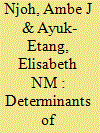

|
|
|
|
|
| Summary/Abstract |
This paper analyzes ecofeminism operationalized as the relationship between women and the natural environment. It treats ecofeminism as context-dependent and not a universal construct as suggested in the literature. It focuses on the political, economic, social, technological, ecological, cultural and historical (PESTECH) context of ecofeminism in Anglophone Cameroon, a polity with a unique pre-colonial, colonial and post-colonial experience. Each dimension is shown to impact women–nature relations in its own unique way. This underscores the need to be more discerning and attentive to context in any analysis of ecofeminism.
|
|
|
|
|
|
|
|
|
|
|
|
|
|
|
|
| 6 |
ID:
182456


|
|
|
|
|
| Summary/Abstract |
Despite best hopes of social and urban transformation, Johannesburg’s middle-class suburbs have remained largely inaccessible to lower income and more marginalised communities. This article examines the everyday practices and repertoires of action by resident associations in Johannesburg, demonstrating their ability to moderate more progressive state impulses and other land use changes. It argues that resident associations have become the custodians of middle-class visions and aesthetics and carry out the boundary work and symbolic violence that maintains and defends suburban borders.
|
|
|
|
|
|
|
|
|
|
|
|
|
|
|
|
| 7 |
ID:
182464


|
|
|
|
|
| Summary/Abstract |
Factors affecting households’ choices to participate in markets are often not disaggregated by gender, leading to policies that are insensitive to women’s needs. Using qualitative and quantitative methods, the study analysed challenges faced by male and female-headed households in goat commercialisation in the semi-arid Msinga area of South Africa. The main constraints were poor condition of goats and mortality, high illiteracy rates of women, shortage of transport to take goats to the market and limited access to information. The study recommends that women be provided with greater market access and information and for the government to avail more attractive investment opportunities to reduce the use of goats as a store of wealth.
|
|
|
|
|
|
|
|
|
|
|
|
|
|
|
|
| 8 |
ID:
182457
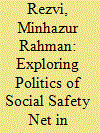

|
|
|
|
|
| Summary/Abstract |
The purpose of the study is to explore the politics of beneficiaries’ selection and resource distribution of social safety net (SSN) programs and how local elites and political groups establish political settlement by using it as a tool. In developing countries, formal systems are not strong enough and elites’ groups use their power to create informal institutions for securing their interests. As other studies have shown, informal politics influence the processes of selection and distribution of SSN programs in Bangladesh. The study is qualitative in nature and the selected research area is Rajakhali Union in Cox’s Bazar District. The study found that informal systems (e.g. clientelist politics, political affiliation, personal conflicts, and kinship) determine the selection and distribution of SSN programs. The Union Parishad (UP) members distribute the SSN programs to their ineligible clients (supporters, local elites, and political groups) by bypassing the formal systems for strengthening clientelist relations, increasing their legitimacy, stabling their power, and increasing their vote banks. They (UP members, political elites, and local elites) have allowed introducing more informal structures that better serve their interests. They have used the SSN programs as a tool for establishing the political settlement (distribution of power between UP members and local elites).
|
|
|
|
|
|
|
|
|
|
|
|
|
|
|
|
| 9 |
ID:
182471
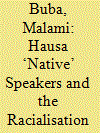

|
|
|
|
|
| Summary/Abstract |
The colonial encounter between the Hausa and the British produced multiple layers of experiences both for the coloniser and the colonised. In addition to its violent history of conquest and domination, it created a ‘text’ of learning through which ideas of ‘mixing truth with falsehood’ were presented, localised and propagated as counterweight to the dominant Muslim epistemology. Mediating and navigating these spaces require deeper understanding and the skilful weaving of divergent epistemologies of the world. In this article, the role of the ‘native speaker’ as a cultural broker is explored.
|
|
|
|
|
|
|
|
|
|
|
|
|
|
|
|
| 10 |
ID:
182461
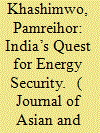

|
|
|
|
|
| Summary/Abstract |
India’s energy security is intricately linked to economic and population growth, accessibility, availability, affordability, and supply and demand. India’s quest for energy security is going slow and after a late start. India embraced various domestic efforts and has drawn up supplier relationships around the globe in coal, oil, gas, nuclear, hydroelectric power, and renewable energy. It appears India is not likely to be fully independent of external sources of supply for its energy requirements in the short-term and medium-term. There is no major technological breakthrough in alternative energy to free the country from its energy predicament, thus, India needs to adopt multi-dimensional strategic energy security approaches. In the absence of major oil and gas reserves in Indian territory, the country may be forced down a perilous path that includes a massive increase in the use of coal, associated with environmental concerns, and increasing dependence on external sources. The key focus of the study is to examine the key concerns, trends, challenges, and various options available to India to face the challenges in energy security.
|
|
|
|
|
|
|
|
|
|
|
|
|
|
|
|
| 11 |
ID:
182470


|
|
|
|
|
| Summary/Abstract |
The efficacy of indigenous knowledge and local participation has been argued to be some of the pathways to curbing the present indigenous community development impasse. Employing an in-depth qualitative research approach, 32 traditional and community development leaders as well as local government officials were interviewed to ascertain local the present community development paradigms and proposed future pathways. Drawing from local insights and a range of scholarly perspectives this paper assessed how meaningful indigenous knowledge systems and indigenous people can actively engage and sustain community-driven development programmes. Utilizing a process analysis, the paper, established that there is a disconnect between indigenous community knowledge systems, values, norms and other cultural realities and contemporary participatory community development approaches. It further illustrates, the absence of local participation in community development and proposed a framework for the integration of indigenous knowledge systems, institutions and other cultural realities in community-based development programmes to ensure development sustainability.
|
|
|
|
|
|
|
|
|
|
|
|
|
|
|
|
| 12 |
ID:
182459


|
|
|
|
|
| Summary/Abstract |
Meaningful community participation is core to the long-term success of protected areas. Hence, it is important to understand what drives neighbouring community attitudes and perceptions. This study sought to determine local community attitudes towards conservation and protected areas, as well as their perceptions of benefits and participation at Borakalalo National Park. Semi-structured interviews were held with experienced park officials, while a structured household survey and focus group discussions were conducted across five surrounding villages. The results highlighted a number of interesting findings, including widespread support for biodiversity conservation and protected areas offset by considerable negativity towards Borakalalo itself. It was also determined, despite stated co-management policies, community residents perceived there was little meaningful participation and benefits were poorly communicated and unfairly distributed. Pragmatic suggestions were made for jointly developing more effective participation with the communities, despite limited available resources.
|
|
|
|
|
|
|
|
|
|
|
|
|
|
|
|
| 13 |
ID:
182465
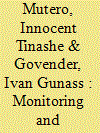

|
|
|
|
|
| Summary/Abstract |
The study argues that the value of arts-based interventions in peacebuilding and development is yet to be fully realised due to a paucity of effective monitoring and evaluation models. In a context of growing attention to the benefits of university community engagement to social change, this article reports on how social practice creative placemaking embedded in engaged scholarship can be assessed for efficiency and its effectiveness in giving salience to silenced and ‘unusual’ voices in the pursuit of social justice. We propose an effective monitoring and evaluation model that shows the change development processes and can track and attribute causality.
|
|
|
|
|
|
|
|
|
|
|
|
|
|
|
|
| 14 |
ID:
182469


|
|
|
|
|
| Summary/Abstract |
In this article, we examine the multilingual realities of language contact at the University of Zambia. Using an ethnographic research design, we observe the dynamics of the students’ language practices both in the physical and on the online landscape. As our locus, we use a physical conversation and Facebook narratives in which students drew on English and Bemba to illustrate instances of blending and mixing as multilingual practices arising from translanguaging. We show that the mixing of words and the blending of morphemes from the two different languages gives evidence of how students (re)create, (re)produce, and (re)shape their meaning-making instances.
|
|
|
|
|
|
|
|
|
|
|
|
|
|
|
|
| 15 |
ID:
182472


|
|
|
|
|
| Summary/Abstract |
Japan is a developed country where many women, having obtained a higher education and entered the labour force, increasingly postpone childbirth and motherhood beyond their most fertile years. Whilst such a trend has been documented almost everywhere in the developed world, what is conspicuous about the particular case of Japan is how limited these women are when it comes to their options to build a family through assisted reproduction. This article puts the spotlight on five kinds of fertility patients in Japan who, by being largely denied access to assisted reproduction domestically, are pushed to seek solutions abroad, driving the regional (and global) demand for such arrangements. The article identifies as instrumental to this trend the restrictive regime created by the Japan Society of Obstetrics and Gynaecology.
|
|
|
|
|
|
|
|
|
|
|
|
|
|
|
|
| 16 |
ID:
182466


|
|
|
|
|
| Summary/Abstract |
Health burden, coping strategies and access to public healthcare facilities are examined using a medical ecological approach and ethnography among Ibarapa nomads. They live in bands in far distances from Yoruba populated towns in the Ibarapa area, where grazing culture makes healthcare facilities inaccessible. Vulnerable to high morbidity and health risks due to snake-bites, malaria, zoonosis and some other infections, but lacking healthcare facilities, they mostly use faith-based healing, herbal remedies and self-medications. Seventeen percent of the nomads access healthcare facilities from distant towns in Ibarapa. Equitable access to healthcare requires mobile healthcare for semi-sedentary nomads and permanent health clinics for sedentary nomads.
|
|
|
|
|
|
|
|
|
|
|
|
|
|
|
|
| 17 |
ID:
182473
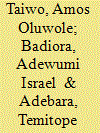

|
|
|
|
|
| Summary/Abstract |
Against the background of the solution-defying incidence of child labourers in Nigerian cities, this study examined the relationship between public spaces and incidence of child labourers in Ibadan Municipality, Nigeria. Data were obtained through direct counting of child labourers and cursory observation of the physical and environmental compositions of their places of operation. The direct counting was conducted for seven days of the week in the morning, afternoon and evening within defined activity-nuclei purposively selected across three densities of residential areas of the municipality: high, medium and low. The data collected were subjected to descriptive statistics. Findings showed that the incidence and categories of child labourers varied with public spaces and density of residential areas, and also followed the concentric, sector and multiple nuclei theories of urban land use. The study, therefore, recommended that urban planners and government have roles to play in offering lasting solution to the menace of child labour.
|
|
|
|
|
|
|
|
|
|
|
|
|
|
|
|
| 18 |
ID:
182462
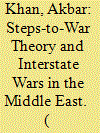

|
|
|
|
|
| Summary/Abstract |
I employ Steps-to-War theory to analyze interstate wars in the Middle East by adding an additional escalating step: state sponsorship of non-state actors. Remarkably, however, the present scholarship completely overlooks a comprehensive assessment of the impacts and roles of state-sponsored terrorism on escalation of interstate militarized conflicts. None of the conflict studies focuses on state-sponsored terrorism and escalation of interstate conflict. This gap still exists despite a remarkable growth in the conflict literature. This article argues that the Steps-to-War thesis is a useful framework for understanding why states end up fighting wars by answering the questions: How does state-sponsored terrorism escalate interstate conflict? And how does each step intertwine with other steps and make war more likely? This paper’s primary argument is that state-sponsored terrorism increases the likelihood of war by providing another escalating step in conjunction with other steps and, therefore, aligns with Steps-to-War theory, and is one of the leading escalating factors. Ultimately, this article argues that this claim has a solid basis, and the Middle Eastern cases vividly demonstrate the escalatory ability of state-sponsored terrorism because state-sponsored terrorism interacts with and reinforces other escalating factors.
|
|
|
|
|
|
|
|
|
|
|
|
|
|
|
|
| 19 |
ID:
182458


|
|
|
|
|
| Summary/Abstract |
Using the ethnography of communication approach as the research construct, an examination is made of the domain of writings and stickers on vehicles that communicate moral and cultural values to the type of reader who constitutes the major audience for this type of vehicle insignia. The data used were drawn from face-to-face interviews and questionnaires, as well as from writings on commercial vehicles in southwestern Nigeria. Findings show that writings on vehicles that convey moral and cultural values are veritable linguistic instruments for imparting edifying messages that can help in redirecting and reorientating the general public.
|
|
|
|
|
|
|
|
|
|
|
|
|
|
|
|
| 20 |
ID:
182460
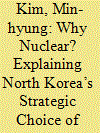

|
|
|
|
|
| Summary/Abstract |
This article seeks to provide a theoretically compelling account for North Korea’s strategic choice to go nuclear and explores its implications for East Asian security. Its main research question is as follows: despite the obvious risks of going nuclear, what makes North Korea so desperate in its pursuit of nuclear capabilities? Contrary to the extant accounts that only emphasize either nonsecurity variables or an “external security” factor, this article conceptualizes North Korea’s security considerations as “regime survival” and explains its strategic choice from it. The central thesis of this article is that North Korea’s decision to go nuclear is a strategic choice, of which the purpose is to achieve its goals of safeguarding independence from external powers as well as ensuring regime security. North Korea pursues nuclear weapons because they not only protect Pyongyang’s regime from foreign aggressions but also help to consolidate Kim Jong-un’s domestic power. North Korea also seeks nuclear weapons in order to safeguard its independence and autonomy from China because the removal of China’s influence is critical to ensuring its regime survival in the long run. North Korea’s strategic choice to go nuclear and its emergence as a de facto nuclear power have significant implications for East Asian security.
|
|
|
|
|
|
|
|
|
|
|
|
|
|
|
|
|
|
|
|
|